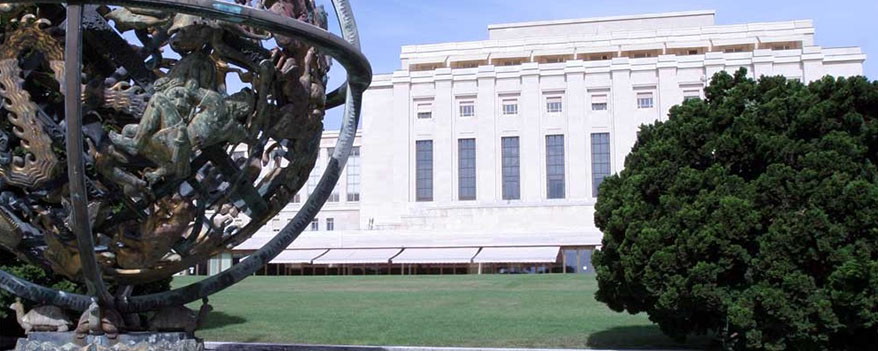On January 28, the United Nations will hold the first session of its newly established Open Ended Working Group (OEWG) on nuclear disarmament. The OEWG, which will meet in Geneva, is open to all UN member States as well as representatives from international organisations and civil society (Click here for a copy of the invitation letter to civil society to participate in the opening session).
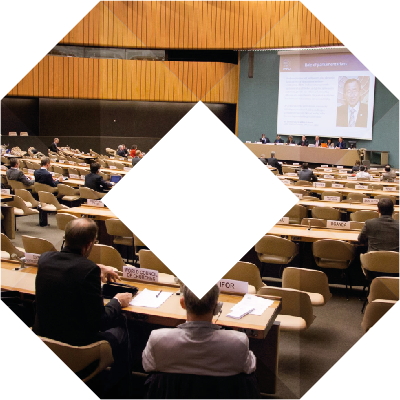
UNFOLD ZERO and others have been calling for the establishment of an OEWG as the best option to take forward multilateral negotiations for nuclear disarmament (see UN General Assembly to re-open the door to a nuclear-weapon free world?).
Since the UN agreed in December last year to establish the OEWG, UNFOLD ZERO has been meeting with key delegations in Geneva in preparation for the OEWG sessions which will be held in January, February, May and August this year.
We call on your support and action to make the OEWG successful (see Action to Support the OEWG below).
Background
The very first resolution of the United Nations General Assembly, adopted by consensus in January 1946, called for proposals to eliminate from national arsenals atomic weapons and other weapons adaptable to mass destruction.
The objective of complete nuclear disarmament was affirmed in the 1969 Nuclear Non-Proliferation Treaty (NPT) as a legal obligation. And in 1996, the International Court of Justice affirmed that the obligation to negotiate for nuclear disarmament was universal, i.e. it applies to all States (even those that are not members of the NPT). The ICJ also affirmed that the obligation to negotiate for nuclear disarmament is unconditional, i.e. that such negotiations cannot be delayed until conflicts are resolved, the world is a safer place or general and complete disarmament is achieved.
Despite the end of the Cold War in the early 1990s and the legal obligation to negotiate for nuclear disarmament, very little progress has been made to achieve this goal. The Conference on Disarmament (CD), which was established to negotiate disarmament agreements, has been unable to commence any such negotiations for 20 years (since the adoption of the Comprehensive Nuclear Test Ban Treaty). The strict consensus rule of the CD has made it possible for any CD member government, at any time, to veto proposals for negotiations – and even to veto proposals for deliberations.
Frustration at this lack of progress led a majority of UN member states to support a UN resolution to establish an OEWG on nuclear disarmament, which was adopted on December 7. 2015.
Only 65 countries (1/3 of the UN membership) are members of the CD, and civil society have no standing there. The OEWG, on the other hand, will be open to all UN member countries as well as international organisations and representatives from civil society. In addition, the OEWG will operate by UN General Assembly rules, not CD rules. This provides the possibility to discuss any proposals proposed by governments or civil society, and to vote on key proposals and final recommendations of the OEWG if consensus is not achieved.
Role of OEWGs
OEWGs are established by the United Nations when there is general support for a legal measure – such as a disarmament agreement – but not yet agreement on the nature or scope of such an agreement. The OEWG provides a forum to explore proposals for possible agreements, determine which proposals could be effective and achieve widespread support, and therefore pave the way for negotiations.
The OEWG established by the UN in 2008 to address the arms trade is a successful example of this. The UN resolution establishing the OEWG recognised that ‘in view of the complexity of the issues of conventional arms transfers, further consideration of efforts within the United Nations to address the international trade in conventional arms is required’ to achieve ‘a balance that will provide benefit to all, with the principles of the Charter of the United Nations at the centre of such efforts.’ The OEWG was tasked to ‘further consider those elements’ [required for control of the arms trade] ‘for their inclusion in an eventual legally binding treaty on the import, export and transfer of conventional arms.’
By 2009 the OEWG had built sufficient agreement on the general elements for a legal instrument that the UN General Assembly was able to establish a negotiating conference (UNGA Resolution 64/48). However, the UNGA recognised that additional work was required on the specific elements, and therefore tasked the OEWG to continue its work for two more years as a preparatory process for the Arms Trade Treaty negotiations. The process succeeded in the adoption of an Arms Trade Treaty in 2013 (UNGA Resolution 67/234B).
An OEWG on nuclear disarmament could follow a similar path of deliberations moving into negotiations on a legal instrument (or instruments) to be adopted by a UN-established negotiating conference.
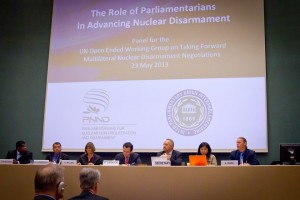
2013 OEWG on nuclear disarmament – some preparatory work already done
The OEWG to meet in 2016 is not the first OEWG on nuclear disarmament. In 2013 the UN held an OEWG which explored the legal measures required to achieve a nuclear weapon free world and various approaches/processes for negotiating such measures. These options include a step-by-step process, a building blocks approach, a framework agreement, a ban on use followed by negotiations for elimination, a comprehensive nuclear weapons convention and a ban treaty agreed by like-minded states as a step to a nuclear weapons convention involving all states.
The final report of the 2013 OEWG, which was adopted by consensus, listed these elements and approaches, but made no recommendations on which approaches would more likely lead to the early commencement of negotiations.
2016 OEWG mandate
The 2016 OEWG follows on from the 2013 OEWG with a mandate to undertake substantive work on the elements and approaches outlined previously in order to pave the way for negotiations. The specific mandate is to:
(i) substantively address concrete effective legal measures, legal provisions and norms that would need to be concluded to attain and maintain a world without nuclear weapons; and
(ii) substantively address recommendations on other measures that could contribute to taking forward multilateral nuclear disarmament negotiations, including but not limited to;
- transparency measures related to the risks associated with existing nuclear weapons;
- measures to reduce and eliminate the risk of accidental, mistaken, unauthorized or intentional nuclear weapon detonations; and
- additional measures to increase awareness and understanding of the complexity of and interrelationship between the wide range of humanitarian consequences that would result from any nuclear detonation.
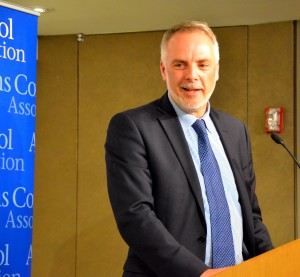
Alexander Kmentt (Director of disarmament, arms control, and nonproliferation in the Austrian Federal Ministry for Europe, Integration and Foreign Affairs), told Arms Control Today that the working group “will clearly not negotiate a legally binding instrument” on nuclear disarmament or bind participants to a particular outcome.
However, Kmentt, who was the 2014 Arms Control Person of the Year, adds that the OEWG could undertake very useful work on two main tracks – the “feasibility of different proposals on effective legal measures, legal provisions, and norms,” and “other aspects that are important for advancing multilateral nuclear disarmament negotiations, such as risk reduction and transparency.”
OEWG participation – engaging the nuclear armed and umbrella States
The resolution establishing the OEWG was not supported by any of the nuclear armed States (with the exception of North Korea), nor any the countries under extended nuclear deterrence doctrines (NATO members, Australia, Japan and South Korea). Some initial work on disarmament could can be undertaken without the participation of these states. However, their participation will be required to achieve any nuclear risk reduction, stockpile reduction or global prohibition measures. An OEWG which does not include at least some of the nuclear armed and umbrella states will not be able to achieve much in concrete work on these measures.
On a positive note, UNFOLD ZERO has learned in its discussions with delegations in Geneva that many of the countries abstaining on the resolution see value in the OEWG and intend to participate.
Stephane Dion, foreign minister for Canada, for example, said in a letter to Parliamentarians for Nuclear Non-proliferation and Disarmament (PNND) that ‘Canada also intends to play an active and constructive role in discussing the way forward for nuclear disarmament negotiations at the upcoming Open‑ended Working Group established by the United Nations General Assembly’s First Committee.’
Some of those opposing the resolution might also join the deliberations. “[t]he U.S. decision to participate will depend upon how the Open Ended Working Group…is structured and will operate,” Blake Narendra, a U.S. State Department spokesman, told Arms Control Today. He added that the United States would welcome the opportunity to participate in a working group that provides for “consensus recommendations on effective measures to advance nuclear disarmament.” See UN Creates New Disarmament Group.
Public and political pressure will be required to encourage participation by those still undecided, and also to encourage those that do participate to do so in good faith in order to advance concrete and significant nuclear disarmament measures, and not to try to block them.
Civil society in the nuclear-armed and allied States has a vital role to play to encourage their governments to participate in good faith in the OEWG.
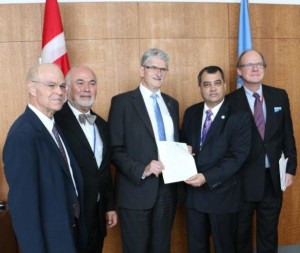
Actions to support the OEWG:
- Encourage your government to participate in the OEWG in good faith.
- Invite your parliamentarian, mayor and/or local religious leaders to endorse the Joint statement for a nuclear weapon free world.
The statement is coordinated by UNFOLD ZERO and our partners Parliamentarians for Nuclear Non-proliferation and Disarmament (PNND), Religions for Peace and Mayors for Peace. UNFOLD ZERO will present this to the OEWG to build political will for disarmament negotiations. - Participate in the OEWG as a civil society representative. Click here for a copy of the invitation to civil society organisations from the United Nations High Representative of Disarmament Affairs to participate in the opening organizational session on January 28. UNFOLD ZERO will keep you updated on how to participate in the substantive sessions in February, May and August.
For more information see UNFOLD ZERO Open Ended Working Group 2016
Documents:
- Memo to governments participating in the OEWG, Human Survival Project

